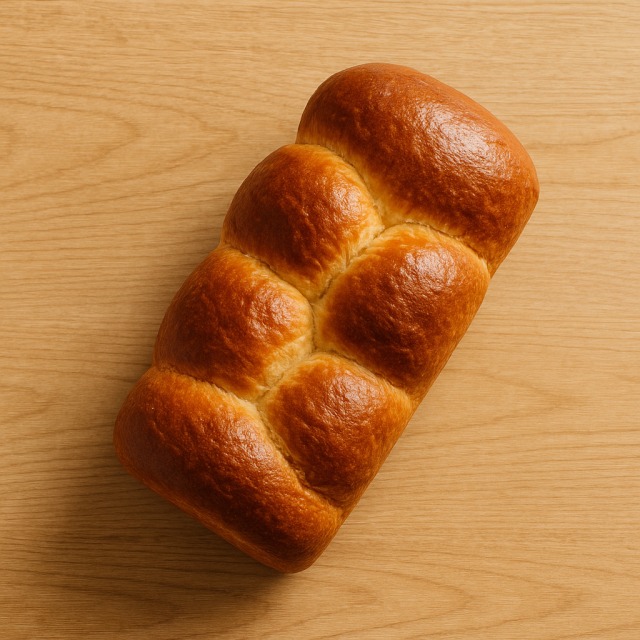Calorie Chart / Breakfast, Snacks / Croissant
How Many Calories Are in Croissant?
Calculation of the nutritional value & Recommended Dietary Intake of croissant
For g and a calorie requirement of kcal
| Calories 190 kcal | Proteins 3 g | Lipids 9 g | Carbohydrates 24 g |
| 10% | 4% | 13% | 9% |
Health benefits of croissant

Croissant - 100g
Calories 271 kcal
Proteins 4.3 g
Lipids 12.9 g
Carbohydrates 34.3 g
The croissant is a moderate-to-high-calorie Viennoiserie (271 kcal per 100 g), mainly because of its butter content. Although rich in calories, it supplies valuable micronutrients: B-group vitamins (B1, B2 and folate) from wheat flour support normal energy metabolism, while butter contributes vitamin A for vision and skin health. Minerals such as calcium, iron and selenium are also present in small but useful amounts. Remember that these nutritional assets are obtained alongside calories, so portion control remains key.
Beyond calories, the laminated layers provide around 4 g of proteins per 100 g—modest, yet helpful for muscle maintenance when eaten with higher-protein sides. Its 12.9 g of lipids include butter-derived short-chain fatty acids that are quickly oxidized for energy, and a little linoleic acid. Carbohydrates (34.3 g) are mainly starch, offering rapid morning fuel. Because calories come with both carbs and fats, the croissant gives a fast sense of satiety, which can help curb snacking if enjoyed mindfully.
Historically, the croissant descends from the Austrian "Kipferl" and arrived in France in the 19th century. Knowing that every buttery layer represents extra calories may encourage you to savor it slowly. Enjoying the aroma and flaky texture can increase satisfaction without adding more calories.
In summary, croissant calories are considerable, but the pastry also offers B-vitamins, vitamin A and essential minerals. Treat it as an occasional energy boost rather than an everyday staple, and you will benefit from its nutrients while keeping calories in check.
Tips for incorporating croissant into a balanced diet
If you monitor calories yet wish to keep croissants in your diet, start with a balanced breakfast: one croissant, a piece of fresh apple, and a pot of yogurt. The fruit adds fiber that slows carbohydrate absorption, while the yogurt offers extra proteins without too many calories. This trio provides flavor variety and helps stabilize blood sugar despite the croissant's calories.
Another idea is to slice a croissant horizontally and fill it with sliced almond & apple compote instead of jam. Almonds increase proteins and good fats, making the calories more satiating. For an even lighter option, serve a half-croissant with a large cup of coffee and a glass of water; the liquid volume promotes fullness, so you may consume fewer total calories over the morning.
At brunch, pair mini-croissants with a plate of scrambled eggs—sorry, not in database—choose "egg" plus tomatoes. Eggs add high-quality proteins that offset the croissant's mainly carb-fat calories. You could also alternate your pastry days with a slice of wholemeal bread to reduce average daily calories. Finally, remember that an active day—say, a long walk or a workout—creates an energy buffer, letting you enjoy croissant calories guilt-free.
Classic recipes such as croissant sandwiches with smoked salmon and cucumber, or a savory croissant baked with emmental, can fit a balanced menu when complemented by a green salad. Just tally the added cheese or fish calories before you indulge.
Frequently Asked Questions
- How many calories are in a croissant?
- There are 271 kcal per 100 g.
- Are croissant calories higher than those of a chocolate croissant?
- The plain croissant averages 271 kcal/100 g, whereas a chocolate croissant generally exceeds 400 kcal/100 g because of the added chocolate stick.
- How can I reduce croissant calories without giving it up?
- Opt for a mini-croissant (about 30 g ≈ 80 kcal) or share one; accompany it with protein-rich foods to stay full and avoid adding butter or jam, which would increase calories.
- Do frozen croissants have different calories?
- Ready-to-bake frozen versions typically contain similar calories; any variation depends on butter percentage. Always read the label.
- Is a croissant suitable before a workout?
- Yes, its mix of fast carbohydrates and fats provides lasting energy. Just account for the 271 kcal in your total workout day calories.
- How many croissant calories come from fat?
- Roughly 12.9 g of fat deliver about 116 kcal, meaning around 43% of total croissant calories stem from lipids.
- Can I include croissant calories in a weight-loss plan?
- Yes, as long as you budget them. For example, swap an evening dessert for the morning croissant so daily calories remain within your target.
Similar foods
Information provided by Calorie Menu may contain inaccuracies or errors. It cannot, under any circumstances, substitute medical advice or medication.










